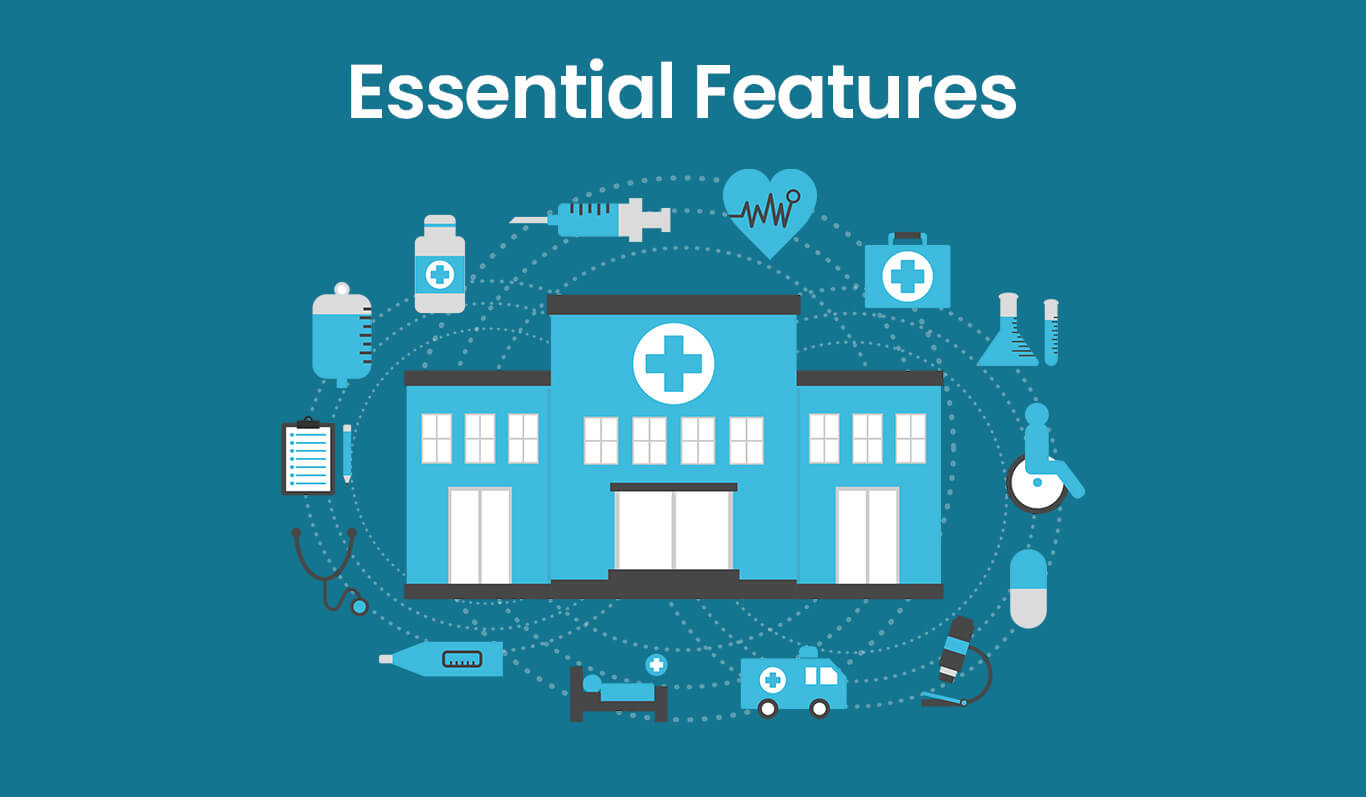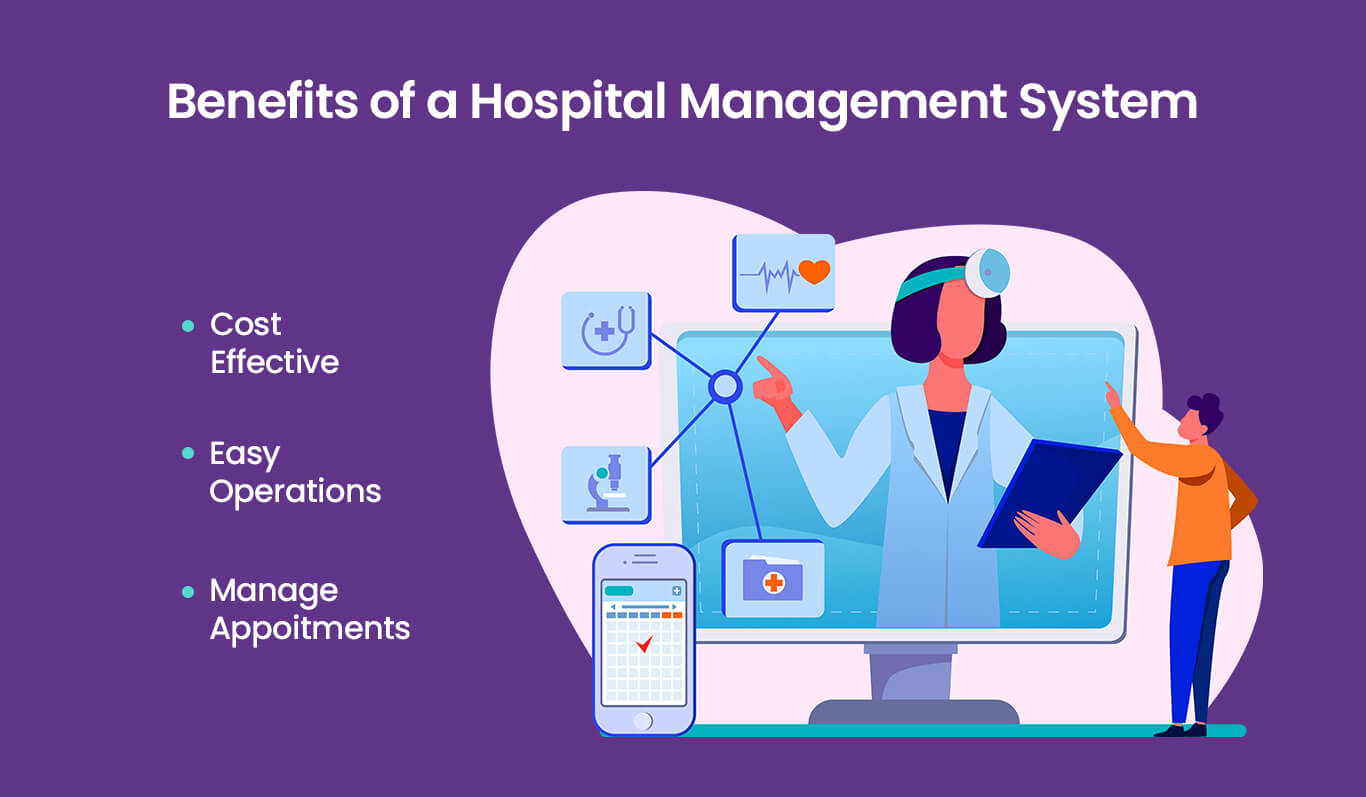How Much Does It Cost to Develop a Hospital Management System?

As an industry responsible for millions of lives, healthcare is undoubtedly one of the most significant economic sectors. The health industry provides care to billions of people around the world. As monitoring and taking care of health is crucial to people's well-being, the healthcare industry is a vital part of society in general.
The use of technology in healthcare has become increasingly important. Owing to its impact and contribution to healthcare, hospital management systems (HMS) has become an integral part of people's lives. The HMS is an effective tool for gathering patient data, keeping vital records secure, automating scheduling, and doing so much more. How much does it cost to develop a hospital management system?
Read on to understand the cost, benefits, and features of hospital management systems.
What is a Hospital Management System?
Healthcare management software is used to manage all aspects of a clinic's workflow, including medical, financial, legal, administrative, and healthcare. A digital record of the hospital's activities allows professionals to keep track of their activities systematically.
Healthcare professionals can interact with their patients more easily and effectively with the Hospital Management Software. Through the use of hospital management systems, doctors and nurses are able to diagnose and treat patients more accurately.
Patients have a glitch-free experience at the hospital, and proper working order is ensured to achieve optimum results. In order to ensure scalability and integrated patient care, it facilitates departmental collaboration with a smart hospital management system.
Types Of Hospital Management Systems
Hospital management software can be divided into multiple categories based on its functions. The most popular types of hospital management software in the market are:
The administrative system
An HMS of this type collects, stores, and processes all the patient-doctor interaction data. Among the data included in a patient's record are his or her treatment course, medical history, medical assistance, medications, and other details. As well as analyzing patient health records, administrative HMS also reports on the efficacy of treatment methods.
The operational and tactical system
Hospitals and patients can be negatively affected by mistakes in medical data. Operational and tactical hospital systems can help in this situation. A primary objective of this system is to organize and classify medical information. Data from healthcare organizations become truly accessible and interoperable thanks to this system. Medical data inconsistencies can also be detected by it. However, the operational HMS also offers various levels of data access to suit different user statuses despite interoperability.
Task-based systems
A medical organization has thousands of tasks to complete every day. Having a task-based HMS can be a great solution for managing tasks and supervising employees. Rather than manually assigning tasks to specialists, this system can help clinics automatically assign them to suitable specialists. The employees receive detailed task descriptions and timeframes within a few hours of the task being created.
ubject-based systems
The software converts patients' paper records into EHRs or EMRs (Electronic Health Records). The problem with paper is that it is easy to lose and hard to manage. Thus, subject-based systems are vital for hospitals because they reduce risks associated with paper documents while properly managing data. Virtually sharing, updating, and deleting data are also possible with these systems.
Financial or billing systems
Additionally, healthcare units must handle billing and insurance operations. The sustainable financial performance of a healthcare organization depends on integrating a financial system. After patients receive medical services, this system sends their treatment records to their insurance companies for payment processing. All financial information is also recorded and stored by billing systems so that it can be retrieved as quickly as possible. The type of software modules you construct will be up to you.
Essential features to build HMS
As a highly specialized industry, hospital management software requires an array of custom features not commonly found in other industries. An HMS's functionality can be divided into two main categories: management tasks and patient care tasks.

HMS Management-Oriented Features
-
Doctor schedule. Caregivers can monitor and manage their availability, schedule appointments, and make timetables accessible for patients.
-
Operation room management. By scheduling and managing surgical facilities in the hospital, staff can allocate resources more efficiently.
-
Ward management. Using this tool, caregivers can manage hospital departments, track their progress, and plan for the future.
-
Pharmacy management. This helps medical staff monitor medication inventory.
-
Food supply management. When patients are admitted to a hospital for treatment, their diet is usually supervised. With this module, cafeteria staff can order and prepare meals specific to each patient's needs.
-
Inventory and purchase management. Hospital supplies, other than medications, are tracked using this feature. For instance, it keeps track of ambulance fuel consumption, water consumption, and electricity consumption.
-
Laundry management. Makes it easier to keep clean laundry available.
HMS Patient-Oriented Features
-
Patient registration. This feature registers patients for admission to the hospital.
-
Patient admission information. A patient's Electronic Health Records are collected and stored here, and the data can be updated and retrieved as needed after admission.
-
Patient billing and insurance. Managing patient financial operations, such as billing and insurance, is handled here.
-
Emergency care module. This module simplifies the process of registering patients in the ER.
-
Pharmacy information for patients. This helps patients order and refill their prescriptions.
-
Patient notification. This notifies patients of their appointments, medication times, discharge recommendations, etc. This can be enabled through a separate application and linked to the hospital management system.
-
eRx integrations with e-prescription services. This feature makes purchasing medicines faster and easier.
Benefits of a Hospital Management System

Seamless Communication
Faster, more secure, and easier retrieval of patient data would improve hospital efficiency and patient care. The HMS can be integrated into every department for enhanced patient care, leading to increased customer satisfaction and reduced turnover. Even in the world of healthcare, there is severe competition, and patients want an efficient, cost-effective, and secure facility.
Faster and Efficient Operations
By utilizing a health management system, your hospital or health centre can provide better care for your patients through faster processes, the storing and analysis of patient histories, the preparation and access of real-time reports, appointment scheduling and tracking, and many other functions. Managing a large number of patients, records, and other jobs required to run a healthcare facility is easier for employees, too.
Security
With a Hospital Management System, all data remains interconnected and secure via cloud-based software. By doing so, authorized personnel will have easier access to data storage and retrieval. The efficiency and speed of hospital/healthcare facility operations and administrative processes significantly improves with faster access to accurate data.
Cost-Effective
Using a good HMS will reduce the risk of improper billing, financial management, fraud, and other finance-related problems. The requirement for a larger workforce also lowers costs. Automated processes like record maintenance and storage free humans to focus on higher-level tasks. Furthermore, healthcare facilities reduce storage costs by utilizing human capital more effectively. For regulatory compliance, only mandatory physical records would need to be stored.
How Much Does It Cost to Develop a Hospital Management System?
Healthcare management system development cost depends on a number of factors such as the following:
- Features required in the hospital information management system
- Technology stack used
- Software integrations needed
- Location, size, and expertise of the development team
- Development model – in-house vs outsourcing The development cost of a basic app starts from $25,000 to $30,000. If implementing modern technology such as blockchain in healthcare or AI in healthcare, will further increase the development cost.
Conclusion
The aim of hospital management software is to assist the healthcare sector in improving the efficiency and productivity of its services. By building smarter and more efficient healthcare management software by partnering with one of the best healthcare app development companies like Neetable, you can provide better health facilities for your patients. This will also improve the effectiveness of treatments. It provides various benefits such as better record management, synchronized access to data, etc. Considering all its benefits, it is hard to imagine running a health system without healthcare management software.
FAQs
1.What is Hospital Management Software?
It is imperative that organizations and businesses are able to manage data and administration efficiently today. This can be accomplished with the help of healthcare management software.
What benefits does a healthcare management system provide? It provides benefits such as:
- Manage routine tasks, finances, treatments, etc., under one safe and secure platform.
- Enhance communication and coordination between hospital staff and medical supply chain.
- Provide assistance to hospital administration by tracking billing, maintaining patients' contact details, and storing insurance information.
2.What are the features of a hospital management system?
Many features in hospital management systems assist health clinics in administration, patient care, and other areas.
- Appointment Scheduling: Allows patients to schedule appointments online.
- Onboarding of patients: Easily facilitates the onboarding of patients and stores all patient-related data.
- Automated Billing: This is one of its most popular features. Essentially, no manual intervention is required for all amenities and treatments provided to the patient.
- Report generation: This feature allows users to manage and update lab reports and operations using a simple dashboard.
- Consultation Tracker: Patient appointments are assigned automatically based on the doctor's availability.
3.How many modules are used in HMS?
Each system is customized according to the requirements of the customer. The most commonly implemented modules are:
- Operational and Tactical System
- Administrative System
- Subject-Based System
- Task-Based System
- Billing System
Request a Quote
Categories
Popular posts
Best Practices for Software Product Engineering Every CTO Should Implement
2023-14-18How to Build Your Own On-Demand Carpooling App Services?
2023-08-25How to Start an On-Demand Fuel Delivery Business: A Comprehensive Guide
2023-07-28Empowering Miners: How Fleet Management Apps are Transforming the Mining Industry?
2023-07-21A Complete Guide to Develop a Food Delivery App for Restaurants in 2023
2023-07-08Mobile Apps Transforming the Travel Industry: A Game-Changer in Travel Planning and Experience
2023-07-07
